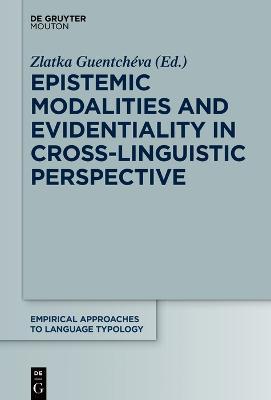Epistemic Modalities and Evidentiality in Cross-Linguistic Perspective

Epistemic Modalities and Evidentiality in Cross-Linguistic Perspective
This volume explores phenomena which come under the heading of epistemic modalities and evidentiality in more or less well-known languages (Germanic, Romance, Balto-Slavic, Hungarian, Tibetan, Lakandon and Yucatec Maya, Arwak-Chibchan Kogi and Ika). It reveals cross-linguistic variations in the structuring of these vast fields of enquiry and clearly demonstrates the relevance and interplay of multiple factors involved in the analysis of these two conceptual domains. Although the contributions present diverging descriptive traditions, they are nonetheless within the broad domain of functional-typological linguistics and give access to distinct yet comparable approaches. They all converge around a number of key issues: modal verbs; the relationship between epistemic modality and evidentiality; the relationship of modal notions with some tense and aspect notions; the notions of (inter)subjectivity, commitment and (dis)engagement; the prosodic variation of modal adverbs, the diachronic connections between negation and evidential markers, the connection with mirativity. The volume is of interest to linguists and advanced graduate students working in general and theoretical linguistics, semantics, pragmatics, cognition, and typology.
Descrierea produsului
This volume explores phenomena which come under the heading of epistemic modalities and evidentiality in more or less well-known languages (Germanic, Romance, Balto-Slavic, Hungarian, Tibetan, Lakandon and Yucatec Maya, Arwak-Chibchan Kogi and Ika). It reveals cross-linguistic variations in the structuring of these vast fields of enquiry and clearly demonstrates the relevance and interplay of multiple factors involved in the analysis of these two conceptual domains. Although the contributions present diverging descriptive traditions, they are nonetheless within the broad domain of functional-typological linguistics and give access to distinct yet comparable approaches. They all converge around a number of key issues: modal verbs; the relationship between epistemic modality and evidentiality; the relationship of modal notions with some tense and aspect notions; the notions of (inter)subjectivity, commitment and (dis)engagement; the prosodic variation of modal adverbs, the diachronic connections between negation and evidential markers, the connection with mirativity. The volume is of interest to linguists and advanced graduate students working in general and theoretical linguistics, semantics, pragmatics, cognition, and typology.
Detaliile produsului












